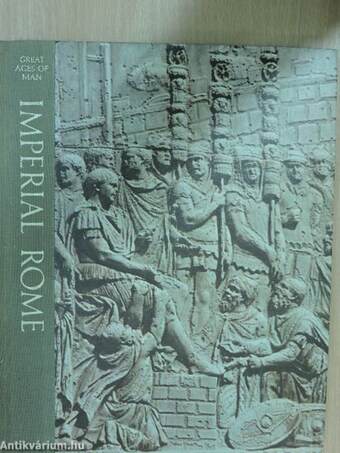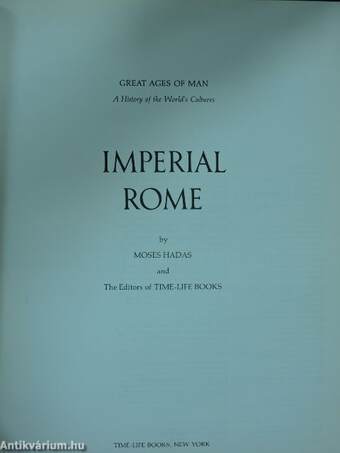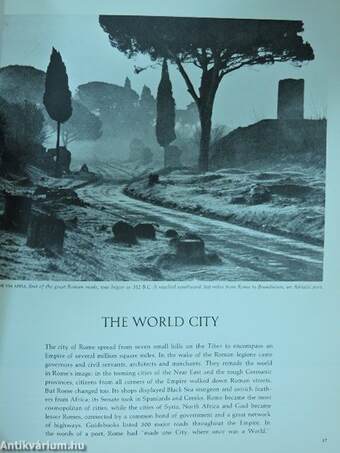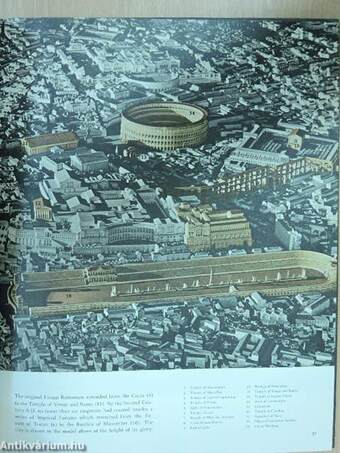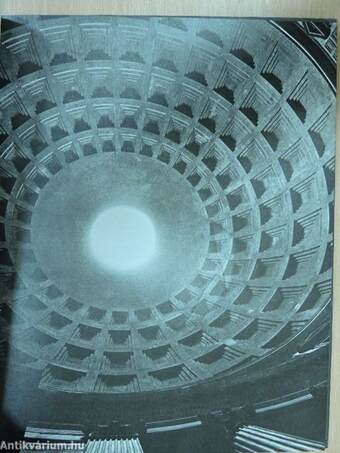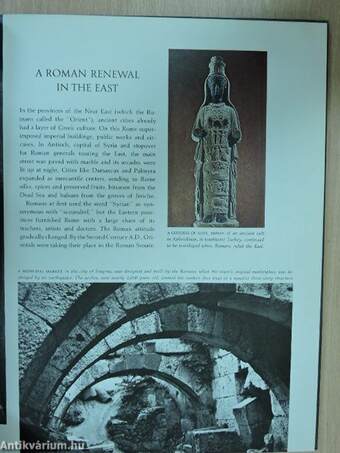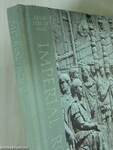1.067.674
kiadvánnyal nyújtjuk Magyarország legnagyobb antikvár könyv-kínálatát

VISSZA
A TETEJÉRE
JAVASLATOKÉszre-
vételek
Imperial Rome
| Kiadó: | Time-Life Books |
|---|---|
| Kiadás helye: | New York |
| Kiadás éve: | |
| Kötés típusa: | Félvászon |
| Oldalszám: | 190 oldal |
| Sorozatcím: | Great Ages of Man-A History of the World's Cultures |
| Kötetszám: | |
| Nyelv: | Angol |
| Méret: | 27 cm x 22 cm |
| ISBN: | |
| Megjegyzés: | Színes és fekete-fehér fotókkal. További kapcsolódó személyek a kötetben. |
naponta értesítjük a beérkező friss
kiadványokról
naponta értesítjük a beérkező friss
kiadványokról
Előszó
INTRODUCTION
"Not to know what happened before we were born,"
wrote Cicero, "is to remain perpetually a child. For
what is the worth of a human life unless it is wo-
ven into the life of our... Tovább
Előszó
INTRODUCTION
"Not to know what happened before we were born,"
wrote Cicero, "is to remain perpetually a child. For
what is the worth of a human life unless it is wo-
ven into the life of our ancestors by the records of
history?" In these volumes on The Great Ages of
Man an honored place is rightfully given to Rome,
which emphasized so greatly the importance of his-
tory and tradition.
During the years in which Rome grew from a
collection of prehistoric villages near a crossing of
the Tiber to a worldwide empire, there matured the
strong sense of order which was the mark of her
state and her society. Into this she infused the
many cultural and technical achievements of other
peoples which she assimilated, preserved and uni-
versalized. Tradition and personal achievement,
the demand for conformity with ancient ways and
the individual's search for glory, continued in dy-
namic tension throughout her career. They gave
shape to the administration of state and empire, and
to the development of the law. They were formative
elements in a literature deeply concerned with a
people's history and a people's mission.
The continuity from which arose the idea of
Rome the Eternal may well be studied with more
than mere nostalgia in the uncertain world of to-
day. In a time when world agreement is so neces-
sary and yet so hard to realize, Rome recalls the one
period when it was almost realized, a period which
Gibbon considered the happiest in human history.
How did this achievement come to pass, despite the
brutalities of war, conquest and exploitation? Rome
put no pressure on the manifold peoples of the Em-
pire to conform, destroyed no cultural traditions,
and suppressed no difference of language. Instead,
she imposed the way of peace, and built up the in-
stitutional framework which all men then took for
granted as they went about their daily concerns.
She allowed her former subjects to participate in
her government and to satisfy their ambitions
within her system. She won them by the prestige so
gained. Even in the days of Rome's decline a Gothic
chieftain who intended to destroy her and substi-
tute a "Gothia where a Romania had been" so ad-
mired the structure of a state that rested on laws
"without which," he said, "a state is not a state,"
that he turned his efforts instead to the restoration
of Roman power by means of Gothic arms.
We too, whose Constitution was shaped by men
who knew their Roman authors well, should con-
sider Rome's enduring influence. From the Romans
we learned of humane studies and interest in man,
Cicero's humanitas. If such terms as natural right,
equality before the law, government for the good of
the governed, have become commonplaces, it is be-
cause our Roman heritage has made them so.
This book in the Time-Life series on The Great
Ages of Man makes an excellent contribution to our
understanding of Roman achievement and Roman
influence. It is fortunate in the choice of Professor
Hadas as its author. The experience of many years
devoted to the study of the history and the litera-
tures of Greece and Rome has enabled him to pene-
trate deeply into the Roman mind and to present
with liveliness and sympathy the many aspects of
the Roman record and the Roman character.
T. ROBERT S. BROUGHTON
Paddison Professor of Latin Emeritus,
University of North Carolina Vissza
Tartalom
CONTENTS
INTRODUCTION 7
i THE SOBER ROMAN 10
JL Picture Essay: THE WORLD CITY 17
Cy FROM VILLAGE TO EMPIRE 34
Picture Essay: ROMAN HOLIDAYS WITHOUT END 45
THE PAX ROMANA 56
Picture Essay: AUGUSTUS, FIRST EMPEROR 69
A THE RITUAL OF DAILY LIFE 78
1 Picture Essay: MASTERS OF WAR 89
C POETS AND PROPAGANDISTS 102
Picture Essay: HOMAGE TO ITALY 111
X THE GODS OF ROME 120
V^/ Picture Essay: POMPEII: A SELF-PORTRAIT 129
J END OF GREATNESS i40
/ Picture Essay: THE METROPOLIS 147
8 A PERSISTENT PRESENCE isa
Picture Essay: SEEDBED OF CHRISTIANITY 167
APPENDIX 179
Chronologies, 179; Immortal Romans, 182
BIBLIOGRAPHY, ACKNOWLEDGMENTS AND CREDITS 184
INDEX 186
Témakörök
- Idegennyelv > Idegennyelvű könyvek > Angol > Művelődéstörténet
- Idegennyelv > Idegennyelvű könyvek > Angol > Történelem > Európa története > Egyéb
- Művelődéstörténet > Kultúra > Története
- Művelődéstörténet > Átfogó művek, tanulmányok
- Történelem > Idegennyelvű > Angol
- Történelem > Ókor > Római Birodalom



